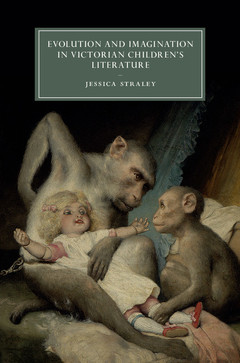Evolution and Imagination in Victorian Children's Literature Cambridge Studies in Nineteenth-Century Literature and Culture Series
Langue : Anglais
Auteur : Straley Jessica

An interdisciplinary study that explores the impact of evolutionary theory on Victorian children's literature.
Evolutionary theory sparked numerous speculations about human development, and one of the most ardently embraced was the idea that children are animals recapitulating the ascent of the species. After Darwin's Origin of Species, scientific, pedagogical, and literary works featuring beastly babes and wild children interrogated how our ancestors evolved and what children must do in order to repeat this course to humanity. Exploring fictions by Rudyard Kipling, Lewis Carroll, Frances Hodgson Burnett, Charles Kingsley, and Margaret Gatty, Jessica Straley argues that Victorian children's literature not only adopted this new taxonomy of the animal child, but also suggested ways to complete the child's evolution. In the midst of debates about elementary education and the rising dominance of the sciences, children's authors plotted miniaturized evolutions for their protagonists and readers and, more pointedly, proposed that the decisive evolutionary leap for both our ancestors and ourselves is the advent of the literary imagination.
Introduction: how the child lost its tail; 1. The child's view of nature: Margaret Gatty and the challenge to natural theology; 2. Amphibious tendencies: Charles Kingsley, Herbert Spencer, and evolutionary education; 3. Generic variability: Lewis Carroll, scientific nonsense, and literary parody; 4. The cure of the wild: Rudyard Kipling and evolutionary adolescence at home and abroad; 5. Home grown: Frances Hodgson Burnett and the cultivation of feminine evolution; Conclusion: recapitulation reconsidered.
Jessica Straley is Assistant Professor of English at the University of Utah. She has published articles on evolutionary theory, vivisection, and Victorian literature in Victorian Studies and Nineteenth-Century Literature, and has contributed a chapter to Drawing on the Victorians: The Palimpsest of Victorian and Neo-Victorian Graphic Texts, edited by Anna Maria Jones and Rebecca N. Mitchell (2016).
Date de parution : 06-2016
Ouvrage de 272 p.
15.2x22.9 cm
Thème d’Evolution and Imagination in Victorian Children's Literature :
© 2024 LAVOISIER S.A.S.



